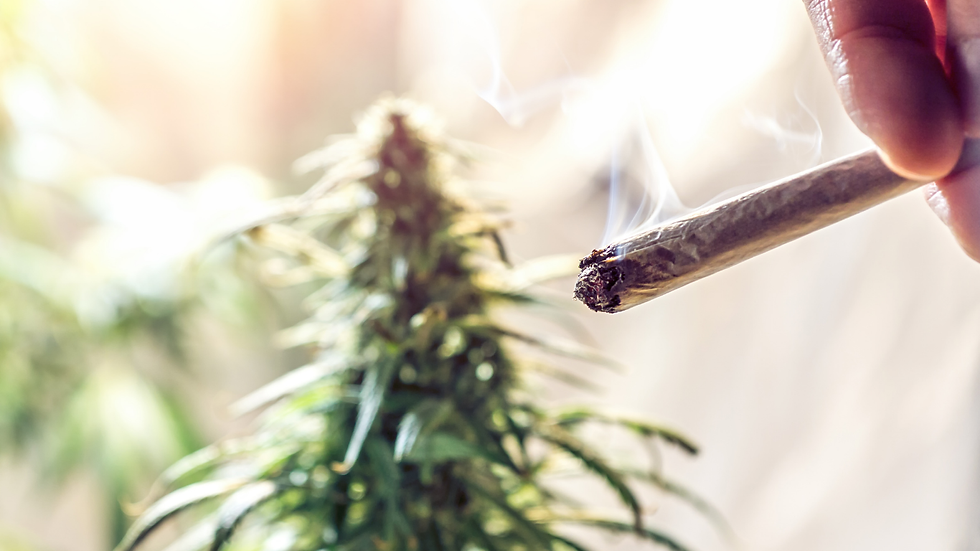What Is THCA? The Beginner’s Guide
- Coastal Calm

- Nov 1, 2025
- 4 min read

If you’ve seen THCA popping up in wellness conversations lately, you’re not alone. It’s one of the cannabinoids in hemp/cannabis that’s gaining attention for its potential health benefits, without the high. But what exactly is THCA? How does it work, is it legal, and what should you watch out for as a consumer? In this beginner's guide, we break it all down.
1. What Is THCA?
Full name: Tetrahydrocannabinolic Acid (THCA)
Nature: A non-psychoactive precursor to THC. It’s naturally found in raw, live, or unheated cannabis/hemp. It does not get you high unless heated (a process called decarboxylation)
Chemistry note: The “acid” means it has a carboxyl group (COOH) that must be removed (by heat) for conversion into Delta-9 THC.
2. How Is THCA Different From THC?
Feature | THCA | THC (Delta-9) |
Psychoactive effect | No, unless heated / decarboxylated (Miraculix) | Yes |
Found in raw plant material | ✅ | ❌ (or much lower) |
Use in raw / live products, juices, tinctures | Common | Less common unless activated |
Legal status / regulations differ | Often gray area or regulated separately | More clearly regulated, more restrictions |
3. Potential Benefits & What Research Shows

THCA is still being studied. Most evidence is preliminary (animal studies, lab work) but promising. Here are areas under investigation:
Anti-inflammatory effects — reducing inflammation is one of the most cited uses.
Neuroprotective properties — potential to protect neurons and help in conditions like Parkinson’s or Alzheimer’s.
Possibly antiemetic (reducing nausea) — helpful for those dealing with nausea from medical treatments.
Pain relief — early signs suggest it might help with pain, especially when inflammation is involved.
Important caveat: Human clinical trials are limited. Much of the data comes from animals or cell cultures. Always consult with a professional before using THCA for medical purposes.
4. Legal Status & Regulations

Because THCA is closely tied to THC, its legality is often complicated. Here’s how things currently stand in the US:
Under the 2018 Farm Bill, hemp and hemp derivatives with less than 0.3% Delta-9 THC by dry weight are federally legal. But the law does not always explicitly address THCA, leading to ambiguity.
Some states use a “total THC” rule which includes THCA (once converted) when assessing compliance. That means even if Delta-9 THC is low, if the THCA can convert to Delta-9, it might count.
Other states treat THCA more like a hemp product—allowed so long as lab tests show compliance. But regulations are evolving.
5. Risks & Safety Considerations

Even though THCA is non-psychoactive in raw form, there are things to watch out for:
Heating → psychoactivity: If you smoke or vape, THCA can convert into THC, producing intoxication.
Dosage & purity: Contaminants (pesticides, heavy metals) or improperly tested products can pose risks. Always look for lab-tested COA (Certificate of Analysis).
Side effects: Dizziness, lightheadedness, sometimes gastrointestinal discomfort; possible interactions with medications.
6. How to Choose Quality THCA Products
Here are tips to help you pick safe, effective THCA products:
Lab testing & transparency: Look for clear COAs, QR codes, third-party lab results.
Source & farming practices: Organic or clean hemp, no harmful pesticides.
Proper storage: THCA can degrade / convert with heat, light. Store in cool, dark places.
Understand forms: Raw flower, tinctures, live resins, etc. Raw or low-heat preparations preserve THCA.5.
Start low, go slow: Begin with small doses to see how your body responds.
7. Frequently Asked Questions (FAQs)
Q: Will THCA make me fail a drug test?
A: Possibly. Some tests check for total THC (after decarboxylation), so even if you use raw THCA, there's risk depending on how it's stored, how much you use, and how the test measures.
Q: Can you get high from THCA?
A: Not in its raw, unheated form. But if you heat it (smoke, vape, bake), THCA can convert to Delta-9 THC, which can cause psychoactive effects.
Q: Is THCA legal in Florida?
A: Laws vary and change frequently. It’s important to check current state regulations. Some products may be legal under hemp rules, others may be restricted if they exceed certain THC thresholds or are heated.
8. Why It Matters for You

Understanding THCA is more than just curiosity, especially if you're shopping for wellness or hemp-derived products. Knowing the difference between THCA vs THC, how products are tested, and what legal status applies in your area can help you make safer, smarter choices.
9. Sources & Suggested Reading

Leafly: “What is THCA and what are the benefits of this cannabinoid?”
Curaleaf: “THCA benefits: What the research says so far”
Miraculix Lab: “THCA vs THC: Effects, Decarboxylation & 2025 Legal Update”
E10 Labs: “The Science Behind THCa and Its Health Benefits”
Conclusion
THCA offers promising benefits, especially for consumers wanting the wellness potential of cannabis without the intoxication. But because science & laws are still catching up, knowing what you’re buying, how it’s produced, and what legal status your state has is crucial. Use lab-tested products, verify the source, and always stay informed. Coastal Calm is here to help you make safe, transparent choices.
Your Calm Starts Here
Whether you’re new to THCA or exploring hemp for balance and focus, Coastal Calm is your trusted guide.We’re here to bring clarity, not confusion science backed info, transparent sourcing, and products that help you unwind without the high.
🌿 Follow Our Journey: [Instagram] [Facebook]
📬 Subscribe: Get wellness guides, new product drops, and educational updates straight to your inbox.